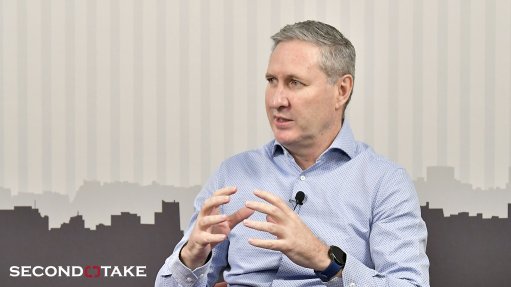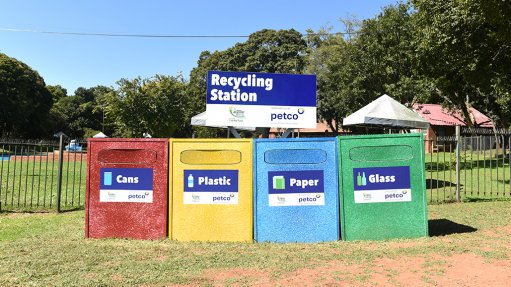‘South Africa can transform itself by embracing the hydrogen economy’ – UP Professor
This article has been supplied by the author and has not been written or solicited by Creamer Media. It may be available only for a limited time on this website.
By Professor Raj Naidoo, Head of the Department of Electrical, Electronic and Computer Engineering in the Faculty of Engineering, Built Environment and Information Technology at the University of Pretoria
Given the country’s current energy crisis and the increasing problems related to the supply of coal-fired sources of electricity, it is time to consider expanding South Africa’s alternative energy sources.
The scale of the crisis has long threatened the stability of the country’s economy, with businesses, especially small businesses, unable to sustain themselves. This leads to job losses and ultimately impacts the livelihood and welfare of South Africa’s most vulnerable people.
While fossil fuels such as coal, oil and natural gas have long proven their effectiveness in providing power for domestic and industrial use, they are becoming harder to extract in a cost-effective manner. Their effect on the environment and human health in terms of their carbon emissions is becoming an increasing source of concern globally.
The urgency to find alternative sources of energy has grown since the signing of the Paris Agreement by 196 parties in 2015. This agreement seeks to limit the global increase in temperature to less than 2 °C by the end of the century. But achieving this target depends on reducing our dependence on fossil fuels and realising carbon-neutrality.
Why hydrogen?
Although South Africa has made huge strides in the renewable energy sector through the introduction of solar, wind and hydropower in recent years, there are many arguments in favour of adding hydrogen to the list of alternatives – both from an environmental perspective, and an economic one.
Most of the challenges related to the large-scale adoption of renewable energy are linked to the efficient storage and transportation of clean energy.
Hydrogen – particularly green hydrogen – is exceptionally energy dense per unit of weight compared to other fuels. This facilitates its storage and transportation. Through its direct combustion, coupled with its use in fuel cells and as an industrial feedstock, it can be produced cost-effectively to support decarbonisation, and presents enormous opportunities for South Africa in the global carbon economy.
Green hydrogen, as an alternative fuel source, is produced in a sustainable manner, with zero emission of carbon. It is mainly produced through the electrolysis of water. Since South Africa is a water-scarce country, use is increasingly being made of desalinated water for this purpose. An additional contribution to the economy is the beneficiation of the country’s platinum group metals, which are used in the manufacture of hydrogen fuel cells.
While carbon dioxide can be a by-product of hydrogen production (through processes using fossil fuels), hydrogen itself emits no carbon dioxide when burned or used in a fuel cell. The production of green hydrogen, however, using renewable fuel sources in the manufacturing process, such as solar and wind, has no toxic or harmful by-products that can lead to pollution.
In addition to the production process resulting in zero emissions, this reduction in pollution has a knock-on effect, leading to the improvement of a population’s health, thus reducing costs associated with the management and treatment of diseases related to pollution. Hydrogen can be used to generate clean electricity when chemically combined with oxygen in a fuel cell. This fuel cell can be used to power vehicles, especially heavy-duty vehicles, and as a heat source in areas such as manufacturing and buildings. Hydrogen can also be produced on-site or centrally, then distributed. This means that hydrogen as an energy source can be a game-changer in remote locations without major infrastructure.
Economies of scale
Of course, green hydrogen is currently very expensive to produce, because the process of electrolysis to separate water into its constituent elements requires large amounts of energy, which is generated from renewables such as solar and wind. However, like most new products, the cost of hydrogen will over time become more cost-competitive. It took 10 to 15 years for solar energy to become more popular and affordable, so one can expect hydrogen to follow a similar path. Also, research into new processes to produce green hydrogen is being enthusiastically pursued globally, which can ultimately also reduce the cost.
Barriers to the introduction of green hydrogen in South Africa include:
Water supply. Since South Africa is a water-scarce country, the supply of continuous water for the process of electrolysis poses a challenge. There is the option of using desalinated sea water, but this will add to manufacturing costs (research suggests that this will be minimal, and the World Economic Forum recently published an article stating that water security globally will not be negatively impacted by the shift to a hydrogen-based economy).
High cost of the renewable energy required for electrolysis to separate water into its constituent elements to produce hydrogen.
Low demand for hydrogen both in South Africa and globally, which directly affects the cost. However, the global shift to increased use of hydrogen for both industrial and residential purposes means the demand is set to increase.
How SA can build a hydrogen economy
Government should put in place regulatory and support instruments, especially at local government level, since this where most of the end users of energy are. These instruments will not only form a framework for the new hydrogen economy, but will help it become more inclusive and provide a legal framework and support for the new jobs created in the process.
Both industry and government must collaborate to re-train and build new skills for the success and sustainability of the hydrogen economy. This collaboration is also important for research and innovation to improve efficiencies and economies of scale.
One such collaboration that is already producing results is a partnership between the South African National Energy Development Institute (SANEDI), an agency established by Parliament to promote technology innovation to establish the efficient use of energy; Bambili Energy, one of the country’s leading manufacturers of hydrogen fuel cells and their subcomponents; and the University of Pretoria (UP). The UP Department of Electrical, Electronic and Computer Engineering has since 2020 been training technicians in the safe installation, operation, maintenance and refuelling of the hydrogen fuel cell systems on which the creation of a hydrogen economy depends. Training such as this helps to position South Africa in the emerging global hydrogen economy.
Our country is currently in an unprecedented position to benefit from the global energy transition and to transform itself by supplying one of the major green energies of the world, which is hydrogen. But in order to capitalise on this opportunity the following must happen:
- Implementation of the South African Hydrogen Society Roadmap (HSRM), published by the Department of Science and Innovation in February 2022. The HSRM lays the map for where we should be placing our energies, how to start, and how we support and incentivise production of hydrogen.
- Formulate and implement regulatory and support frameworks to enable a competitive market to minimise and streamline processes such as renewable energy licensing.
- Grow the skills (and re-skilling) necessary for this new green economy.
- Promote education and training to improve capabilities and knowledge of hydrogen for its safe production, storage, transport, and use.
- Incentivise early investment and a just transition to green hydrogen.
- Build strategic infrastructure such as storage, pipelines, and shipping.
- We need collaboration agreements between hydrogen producers, off-takers, and technology players, which should include capital investment to build scale, realise efficiencies, and lower costs.
Comments
Press Office
Announcements
What's On
Subscribe to improve your user experience...
Option 1 (equivalent of R125 a month):
Receive a weekly copy of Creamer Media's Engineering News & Mining Weekly magazine
(print copy for those in South Africa and e-magazine for those outside of South Africa)
Receive daily email newsletters
Access to full search results
Access archive of magazine back copies
Access to Projects in Progress
Access to ONE Research Report of your choice in PDF format
Option 2 (equivalent of R375 a month):
All benefits from Option 1
PLUS
Access to Creamer Media's Research Channel Africa for ALL Research Reports, in PDF format, on various industrial and mining sectors
including Electricity; Water; Energy Transition; Hydrogen; Roads, Rail and Ports; Coal; Gold; Platinum; Battery Metals; etc.
Already a subscriber?
Forgotten your password?
Receive weekly copy of Creamer Media's Engineering News & Mining Weekly magazine (print copy for those in South Africa and e-magazine for those outside of South Africa)
➕
Recieve daily email newsletters
➕
Access to full search results
➕
Access archive of magazine back copies
➕
Access to Projects in Progress
➕
Access to ONE Research Report of your choice in PDF format
RESEARCH CHANNEL AFRICA
R4500 (equivalent of R375 a month)
SUBSCRIBEAll benefits from Option 1
➕
Access to Creamer Media's Research Channel Africa for ALL Research Reports on various industrial and mining sectors, in PDF format, including on:
Electricity
➕
Water
➕
Energy Transition
➕
Hydrogen
➕
Roads, Rail and Ports
➕
Coal
➕
Gold
➕
Platinum
➕
Battery Metals
➕
etc.
Receive all benefits from Option 1 or Option 2 delivered to numerous people at your company
➕
Multiple User names and Passwords for simultaneous log-ins
➕
Intranet integration access to all in your organisation


















